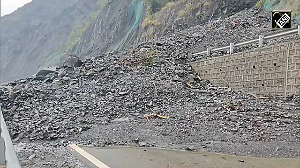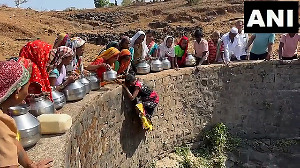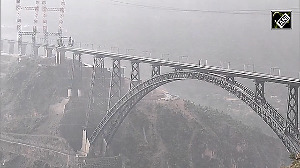The Left parties have given a notice that they will get aggressive after the assembly polls, on major policy issues, saying that the United Progressive Alliance government's 'longevity' depended upon how it implemented the Common Minimum Programme.
The key outside supporters to the government also intend to step up efforts for a 'third alternative' after the polls.
Communist Party of India (Marxist) general secretary Prakash Karat, whose elevation to the top post last year saw the coalition being kept on a leash on a number of issues including disinvestment, told PTI that the Left would insist on the implementation of those aspects in the CMP which were being 'ignored'.
"We will continue to press for those aspects of the CMP, which according to us, would provide corrections to the wrong orientation of policy that have been continuing since the time of the National Democratic Alliance government," he said.
"The longevity of the UPA government is not dependent on us, but on how they perform and implement the CMP. UPA government has to maintain its popular support," Karat said, reminding the government that it had no majority and therefore it should carry everyone along. "It has to realise that there is no national consensus on several national issues," he said.
The interview, in which the Left leader answered a variety of questions, saw him disputing suggestions of Congress going in for snap polls and that the main Opposition Bharatiya Janata Party turning a 'spent force.'
To questions on the 'Third Alternative', Karat sought to emphasise that the concept was far different from the 'Third Front' marked by only electoral tie-ups and bereft of a common programme and policy.
"The Third Alternative will be based on an alternative set of policies, distinct from those of the Congress and the BJP. We will build up support for this credible policy platform with other parties," the CPI(M) leader said.
He said that the Left has decided to raise the policy matters like airport privatisation inside and outside Parliament and also with political parties which can be 'either inside or outside' the UPA coalition. There can be joint platforms and campaigns on such matters.
All the Left parties would individually make their assessments of the political situation in the country after the Assembly polls. "Then we will come to some conclusion collectively to decide on the future course of action."
He said a number of political developments have taken place in the recent past and the Assembly elections would also have an impact on the national scenario. "It will be the appropriate time to make an assessment as the UPA government will also be completing two years."
Asked as to how long the Left would remain a 'silent spectator,' he said, "The arrangement between Left and the UPA involves elements of both cooperation and conflict. That is the reality. There are certain issues, which we can resolve through discussions but there are some others we don't agree... and some on which there can be no compromise."
There were problems on issues like Delhi, Mumbai airport privatisation, Foreign Direct Investment in retail and capital account convertibility. "Government should decide how it should proceed on these matters.... It depends on the UPA how they retain popular support," the CPI(M) leader said.
Asked about veiled criticism by the Congress that the Left parties were 'communalising' foreign policy, he said that had been there since the Left started campaign on their volte face on Iran. "The charge betrays the lack of credibility of the government's stand. Can they muster the support of the people for the government (on the Iran nuclear issue)," he asked.
"Is the struggle for Palestine, which is going on for five decades, a communal issue? We support it, but that does not mean we are communalising it. We are surprised that Congress, which has had a historic role in leading the Non-Aligned Movement, is resorting to such arguments to defend their pro-US orientation. One would have expected the BJP to talk in these terms," he said.
Asked about speculation that Congress was considering snap polls, he said, "I am not aware. I do not think Congress is considering such a thing".
To a question whether he agreed with the contention that BJP was now a "spent force", Karat said the saffron party had recently joined governments in Karnataka and Bihar and there was no question of underestimating its strength. "Its current maneouvres like the Yatras are to revive the communal agenda. The speeches being made and the message
conveyed to the people is hardcore 'Hindutva' agenda," Karat said.
Referring to the Yatras, the CPI(M) leader said a communal campaign was being carried out at the grassroot levels and that the BJP was 'communalising the administration' in states like Madhya Pradesh, Rajasthan and Gujarat where they were ruling.
"Congress and other secular parties should be concerned about these developments," Karat said, referring to the recent tensions in Uttar Pradesh cities of Aligarh and Mau. "There should be no complacency regarding the potential of the communal forces, of which the BJP-Rashtriya Swayamsevak Sangh are the prime movers," he said.
Asked about the recent statement by BJP leader L K Advani that his party and Congress could work together if the latter gave up 'minority appeasement,' Karat said, "There is a class factor in this. Given the Indian situation, the big business and the powerful and affluent sections will like to have the two parties together as they see them as natural allies. But they overlook the basic division between communal and secular forces. Congress has been a secular party and it cannot undermine its own character. The mass base of Congress upholds secular values."
He, however, added that there were instances of 'opportunism' when Congress joined hands with BJP in fighting the Left in Kerala and West Bengal. "They have similar approach on economic policies also. This is not new to us."
On Advani's statement, Karat said he was 'venting his frustration' because his communal agenda was not getting the response they wished for. This is primarily because the Left had succeeded in ensuring that real issues became the focus of attention, he added.
Parrying a question on whether the UPA was a cohesive alliance, the CPI(M) general secretary said even before the
ruling coalition was formed, his party had relations with the Rashtriya Janata Dal, Dravida Munnetra Kazhagam and the Nationalist Congress Party.
To questions on the recent opinion polls predicting the Left returning to power in West Bengal and Kerala, Karat said, "We do not go by opinion polls." He, however, exuded confidence that the Left would form governments in both states.
"There are electoral signposts showing that the Left has gained ground. Recent elections to local bodies, panchayats, municipal corporations and assembly and parliamentary by-elections have shown we have won by bigger margins. That is why we are confident," he added.
Karat said these signposts were not just the endorsement of the West Bengal government's policies, but also what the Left has been doing in the national level. "That is why new sections of the people, including minorities and others, are coming to us," he said.
Also Read:
Complete Coverage: Assembly Elections 2006







 © 2025
© 2025